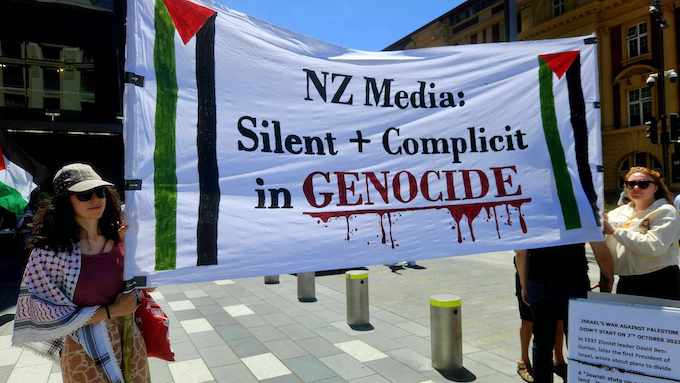By David Robie, convenor of Pacific Media Watch
My message today is really simple but brutal.
Israel kills the journalists deliberately. This is unprecedented. The Western media — including here in Aotearoa New Zealand — kills the truth about genocide in Gaza.
On Boxing Day, an Israeli air strike killed five Palestinian journalists in a clearly marked white vehicle outside a hospital in central Gaza.
- READ MORE: Israel kills five Palestinian journalists in attack on media van
- RSF’s 2024 Round-up: journalism suffers exorbitant human cost due to conflicts and repressive regimes
- Silencing the messenger: Israel kills journalists, while the West merely censors them — David Robie
- Other Israel’s war on Gaza reports

The journalists from the Al-Quds Today TV channel were outside the al-Awada Hospital in the Nuseirat refugee camp when their satellite broadcast van was struck by a pre-dawn Israeli strike.
Video footage that went viral showed the van with the words “PRESS” clearly marked in red block letters engulfed in flames.
Middle East Eye reporter Hani Aburezeq said from the scene: “The van was entirely burnt and destroyed. It was fully engulfed in flames.”
The slain journalists were – let’s honour their names — Fadi Hassouna, Ibrahim al-Sheikh Ali, Mohammed al-Ladah, Faisal Abu al-Qumsan and Ayman al-Jadi.
Jadi had gone to the hospital with his wife who was giving birth to their first child. He had gone out to check on the car and his mates when it was bombed.
Baby born on day father died for ‘truth’
Imagine that, the baby was born on the very day his father died while doing his job as a journalist — reporting the truth.
It is another cruel example of the tragic lives lost in this genocide by Israel which has killed more than 45,400 people, mostly women and children.
Al Jazeera’s report on the journalist killings. Video: AJ
Just last week, four other journalists were killed over two days. And now the total is 201 Palestinian journalists killed since 7 October 2023.
This is by far the highest death toll of journalists in any war or conflict.
By comparison, in the six years of the Second World War only 69 journalists were killed.
And in 20 years of the Vietnam War, just 63 journalists were killed.
Al Jazeera reports that Israel, which has not allowed foreign journalists to enter Gaza except on military embeds with the Israeli “Defence” Forces (IDF), which is increasingly being dubbed by critics as the Israeli “Offence” Forces (“IOF”), has been condemned by many media freedom organisations.
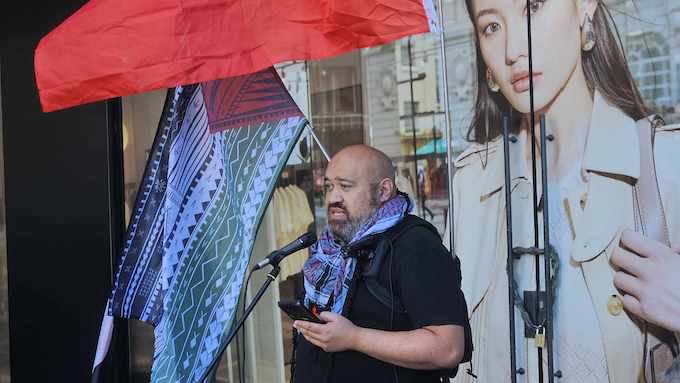
Gaza ‘most dangerous region’
The besieged enclave is now regarded as the “most dangerous region of the world” for journalists, according to Reporters Without Borders in its annual report.
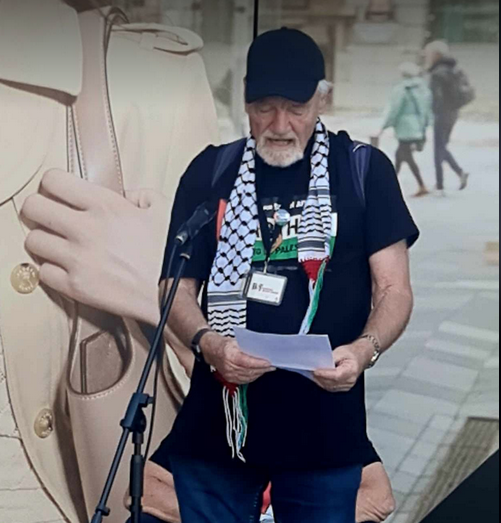
Al Jazeera itself was banned by Israel in May from reporting within the country, and was subsequently barred from reporting within the occupied West Bank and the closure of the Ramallah bureau in mid-September.
Israel has tried to silence Al Jazeera previously in by threatening it in 2017, bombing its broadcast office in Gaza in 2021, and assassinating celebrated journalist Shireen Abu Akleh in 2022 and other reporters with impunity.
Al Jazeera, TRT News and many independent news outlets as Democracy Now!, The Intercept, Middle East Eye and The Palestine Chronicle stand in contrast to mainstream media such as BBC, CNN, The New York Times, and The Washington Post that have frequently been called out in investigative reports for systemic bias against Palestine.
Among the poignant messages from Palestinian journalists documenting this war are Bisan Owda, who signs on her video reports every day with “I’m still alive”.
But I would like to share this reflection from another journalist, videographer Osama Abu Rabee who says on his X news feed that he is “capturing the untold stories of resilience and hope”. He said in one post this week:
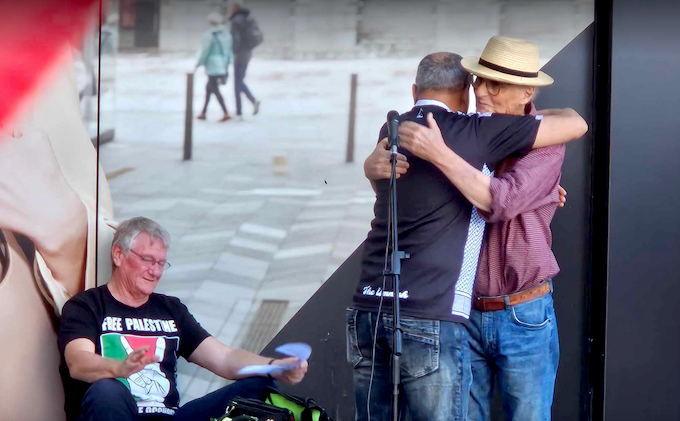
‘Moments away from death’
“One of my most vivid memories is when three journalists and I were in Eastern Jabalia and we needed to connect our e-sims to edit and upload content of a massacre.
“We went to a room but the connection wasn’t good so I suggested we go into another room. Less than 5 minutes later, the room we had been in got bombed.
“People came over running thinking that we were killed but luckily there were only injuries.
“This was one of the many times that I was moments away from death. I know that I’m targeted as a Palestinian but also as a journalist.
“Every single day I step out of my house and put on my ‘press’ vest and I look behind at my family, I’m not sure if I’ll see them again.
“I hope you understand the risks we are taking to show you the truth.
“Even 15 month later, we continue to go out every single day and document the horrors that people in Gaza experience.
“We do this so that when God asks what you do, we respond with ‘we did what we could’.”
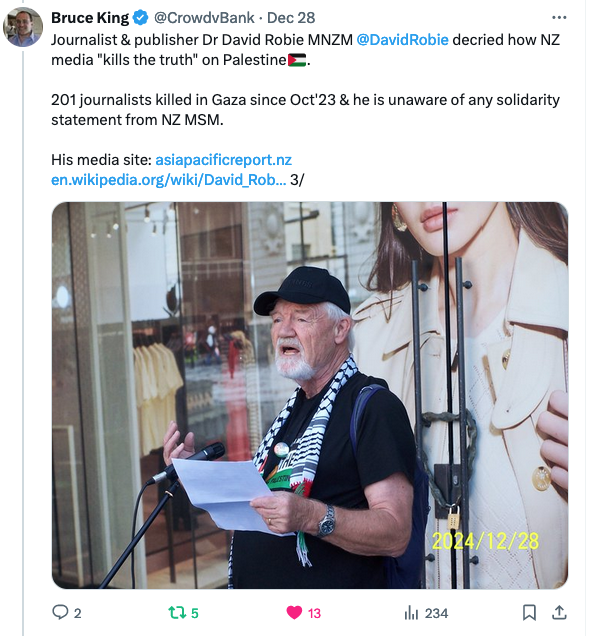
NZ media’s role shameful
Can journalists and the media in Aotearoa New Zealand say with hand on heart that “we did what we could” in the face of this genocide?
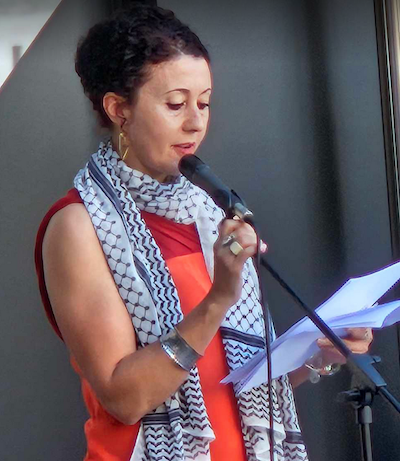
Of course not, the role of New Zealand media has been shameful, apart from notable exceptions such as Gordon Campbell.
It has failed to hold the Christopher Luxon coalition government to account over its pathetic inaction over the genocide.
It has failed to press the government into taking a stronger and more principled stance at the United Nations to call for sanctions against the apartheid and genocidal regime, or to even expel Israel from the global chamber — or the ambassador from Wellington.
It has failed to argue for New Zealand to join the South African-led genocide case against Israel at the International Court of Justice (ICJ).
Take Ireland, a smallish country like New Zealand, as an inspirational example. Earlier this month, Ireland responded immediately to the closure of Israel’s embassy in Dublin by opening a Palestinian museum on the premises.
Prime Minister Simon Harris condemned Israel’s genocidal actions, particularly against children and reaffirmed his country’s commitment to human rights and international law.
He said Ireland would not be silenced over Israel. He continued:
“You know what I think is reprehensible? Killing children, I think that’s reprehensible.
“You know what I think is reprehensible? Seeing the scale of civilian deaths that we’ve seen in Gaza.
“You know what I think is reprehensible? People being left to starve and humanitarian aid not flowing,”
Silence of the news media
Have we ever had such a courageous statement like this from our Prime Minister. Absolutely not.
It is shameful that our government has not taken a stand.
And it is shameful that the New Zealand media has been so silent over this most horrendous episode of our times — genocide, ethnic cleansing and crimes against humanity in front of our very eyes for 15 months.
To my knowledge, journalists in Aotearoa have not made even made statements of solidarity with the journalists of Gaza and their horrific sacrifice to bear witness to the truth.
I made a plea for such a stand last January and it was ignored. Australia is making a better job of challenging the status quo.
New Zealand journalists have already “normalised” the genocide. Shameful.
Dr David Robie is convenor of Pacific Media Watch and editor of Asia Pacific Report. This was first presented as an address to a Palestinian solidarity rally in Aotearoa New Zealand’s Te Komititanga Square in Auckland Tāmaki Makaurau on 28 December 2024.
